Egypt’s Final Redoubt in Canaan
The fiery end of the last Egyptian colony
By ROGER ATWOOD
July/August 2017
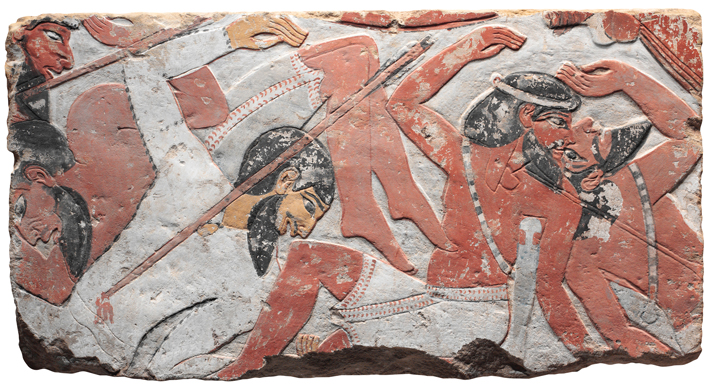
For three centuries, Egyptians ruled the land of Canaan. Armies of chariots and 10,000 foot soldiers under the pharaoh Thutmose III thundered through Gaza and defeated a coalition of Canaanite chiefdoms at Megiddo, in what is now northern Israel, in 1458 B.C. The Egyptians then built fortresses, mansions, and agricultural estates from Gaza to Galilee, taking Canaan’s finest products—copper from Dead Sea mines, cedar from Lebanon, olive oil and wine from the Mediterranean coast, along with untold numbers of slaves and concubines—and sending them overland and across the Mediterranean and Red Seas to Egypt to please its elites.
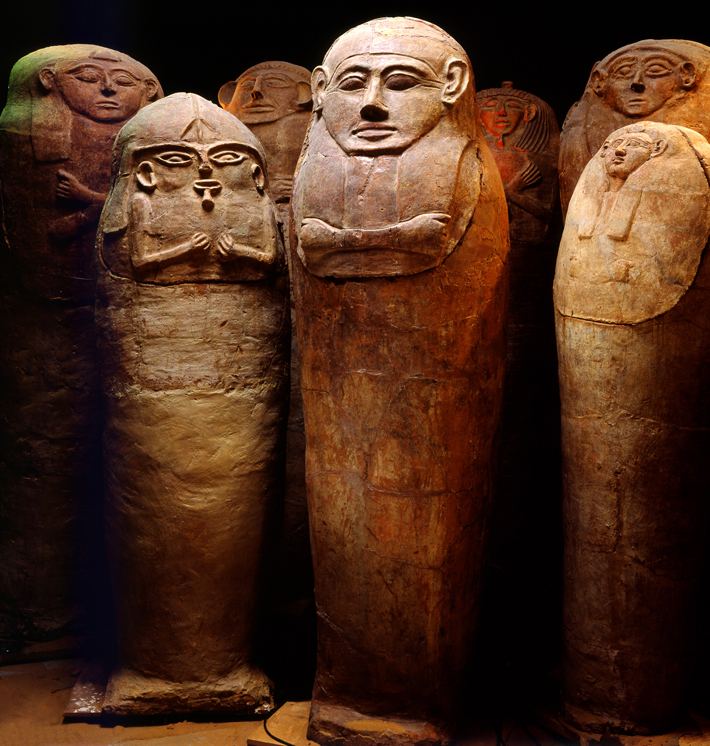
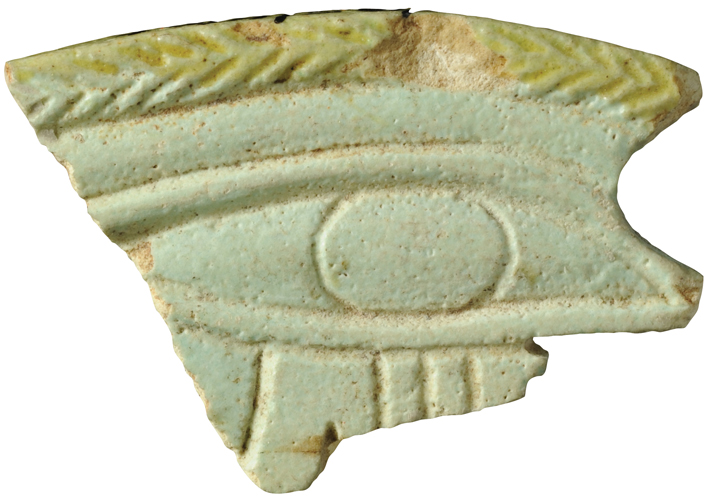 As with many colonial ventures before and since, military conquest led to a new cultural order in the occupied lands. Across Israel, archaeologists have found evidence that Canaanites took to Egyptian customs. They created items worthy of tombs on the Nile, including clay coffins modeled with human faces and burial goods such as faience necklaces and decorated pots. They also adopted Egyptian imagery such as sphinxes and scarabs. For the Egyptians, Canaan was a major trophy. Artists in Egypt carved and painted narratives on the stone walls of temples boasting about vanquished subjects and depicting Canaanite prisoners naked and bound at the wrists.
As with many colonial ventures before and since, military conquest led to a new cultural order in the occupied lands. Across Israel, archaeologists have found evidence that Canaanites took to Egyptian customs. They created items worthy of tombs on the Nile, including clay coffins modeled with human faces and burial goods such as faience necklaces and decorated pots. They also adopted Egyptian imagery such as sphinxes and scarabs. For the Egyptians, Canaan was a major trophy. Artists in Egypt carved and painted narratives on the stone walls of temples boasting about vanquished subjects and depicting Canaanite prisoners naked and bound at the wrists.
Yet Egypt’s presence in Canaan ended sooner than the pharaohs might have expected. With Canaan under assault from seaborne invaders and hit by drought so severe it caused food shortages, Egypt’s colonial rule began to crumble around 1200 B.C., starting in the north and gradually spreading south. Egypt did not fall alone. The eastern Mediterranean’s two other great powers of the day, the Hittites in central Turkey and the Mycenaeans in Greece, saw their capitals sacked and their governments fail. They all toppled in the pan-Mediterranean Late Bronze Age collapse of the twelfth century B.C. Egypt’s 2,000-year-old dynastic system survived, but it lost its trade ties throughout the Mediterranean and its valuable outposts in Canaan.
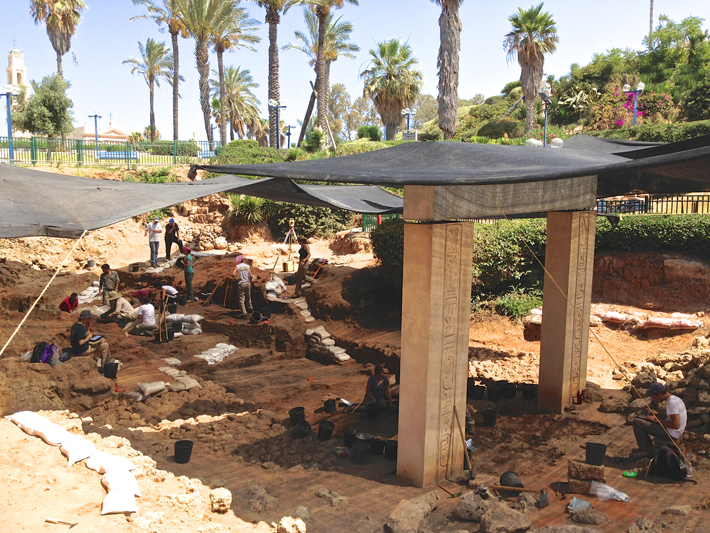 The beginning of Egyptian rule in Canaan, with that smashing victory at Megiddo, is much clearer than its end. Archaeologists digging the remains of Egyptian sites in Israel and combing through ancient texts carved into temple walls and scratched onto clay tablets have never been able to pinpoint exactly when, or even how, Egypt’s occupation of Canaan expired. Did it decline slowly or end suddenly? Was it an orderly withdrawal or a messy rout? Did it fall in the region-wide cataclysm of the Late Bronze Age or were local factors more to blame?
The beginning of Egyptian rule in Canaan, with that smashing victory at Megiddo, is much clearer than its end. Archaeologists digging the remains of Egyptian sites in Israel and combing through ancient texts carved into temple walls and scratched onto clay tablets have never been able to pinpoint exactly when, or even how, Egypt’s occupation of Canaan expired. Did it decline slowly or end suddenly? Was it an orderly withdrawal or a messy rout? Did it fall in the region-wide cataclysm of the Late Bronze Age or were local factors more to blame?
At the port of Jaffa, on Tel Aviv’s south side, archaeologists Aaron Burke of the University of California, Los Angeles, and Martin Peilstöcker of Johannes Gutenberg University of Mainz are finding that the fall of Egypt’s rule came the way Hemingway famously described bankruptcy—gradually, and then suddenly—and was at least partly due to homegrown factors. The Egyptian outpost at Jaffa had an uneasy relationship with the locals, and it apparently met a fiery end. Burke and Peilstöcker have found evidence of two catastrophic blazes, ten years apart, that destroyed Jaffa, the second one occurring in about 1125 B.C. That fire, Burke believes, marked the end of Egypt’s presence not just in Jaffa, but in all of Canaan. “Jaffa was the only Egyptian outpost that was purely military. This was their last line of defense, and once it fell, any remaining Egyptian centers in Canaan would have been cut off from Egypt,” says Burke. He has been excavating the site since 2007, following on digs starting in the 1950s that revealed Jaffa as a walled enclave of pharaonic power whose strained relationship with the surrounding people stood in sharp contrast to the cultural affinity between Egyptians and Canaanites elsewhere. Burke says, “They lived largely at odds with each other. And after the Egyptians left, there is no further trace of their presence here.”
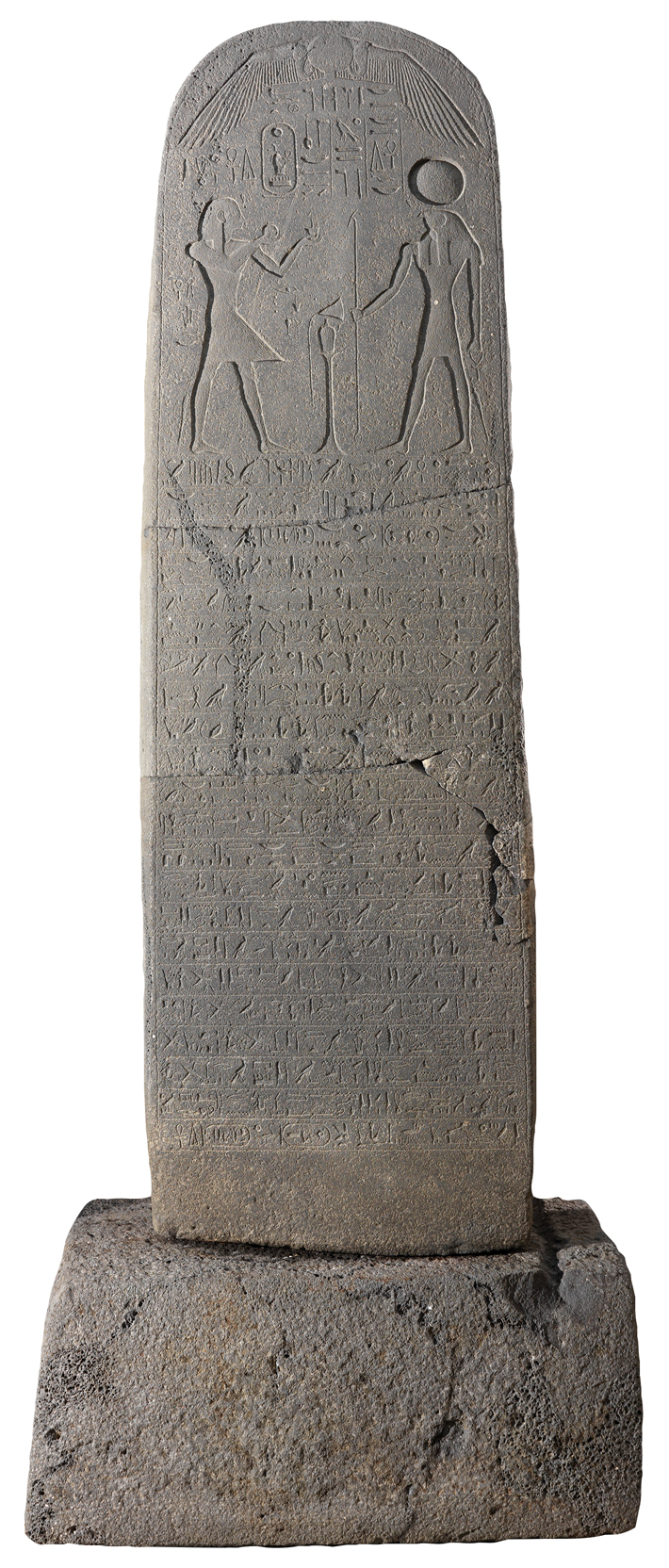 Separated by the Sinai, a bleak and sparsely populated land in antiquity as now, Egypt and Canaan were neighbors whose histories of war, trade, and migration intersected and intertwined over millennia. Egypt’s powerful centralized government ruled along the Nile, where pharaohs built the pyramids of Giza and reigned like gods over people who worshipped them. In contrast, Canaan was a land of warring city-states and hill tribes, spread out over what are now Israel, Lebanon, southwestern Syria, and the West Bank. At Canaan’s peak, there were about 20 such city-states in the southern area alone. Their culture was rustic, their power decentralized and weak.
Separated by the Sinai, a bleak and sparsely populated land in antiquity as now, Egypt and Canaan were neighbors whose histories of war, trade, and migration intersected and intertwined over millennia. Egypt’s powerful centralized government ruled along the Nile, where pharaohs built the pyramids of Giza and reigned like gods over people who worshipped them. In contrast, Canaan was a land of warring city-states and hill tribes, spread out over what are now Israel, Lebanon, southwestern Syria, and the West Bank. At Canaan’s peak, there were about 20 such city-states in the southern area alone. Their culture was rustic, their power decentralized and weak.
Canaan had great mineral and agricultural wealth—and the Egyptians coveted it. As early as the third millennium B.C., the Egyptians established busy trading posts in the coastal city of Ashkelon and in Gezer in the center of the region to buy up exotic products and transport them to Egypt on donkeys, which had only recently been domesticated. A few centuries later, the Egyptians began trading by ship with the seaport of Byblos on the coast of modern Lebanon, bypassing southern Canaan, whose ties with Egypt languished. Over time, Canaan’s states strengthened and, around 1700 B.C., they invaded northern Egypt with a devastating innovation—the horse-drawn chariot—followed by settlers who built cities in the marshy Nile Delta. Known as the Hyksos, a Greek version of an Egyptian phrase that meant “foreign rulers,” they maintained their cultural habits and clashed with Egyptian rule to the south. Ultimately, the Egyptian state, reunified under the pharaoh Ahmose (r. 1550–1525 B.C.), expelled the Hyksos and sent them back to their homeland around 1540 B.C.
A century later, newly self-confident and thirsty for expansion, the Egyptians found the right agent for their ambitions in Thutmose III (r. 1479–1425 B.C.). His lithe, commanding figure can still be seen today smiting Canaanite masses in temple carvings in the old dynastic capital of Luxor. To the south, Nubia fell under Egypt’s military might, too. “Egypt now saw itself as the center of the universe, and all its neighbors were considered enemies and targets for invasion,” says Daphna Ben-Tor, former curator of Egyptian archaeology at the Israel Museum in Jerusalem. Egypt was at the threshold of the New Kingdom (1550–1070 B.C.), the artistic golden age of Hatshepsut, Akhenaten, and Tutankhamun. “As it became richer and reunified,” Ben-Tor says, “its appetite grew for the kinds of high-status goods that Canaan offered, such as copper, turquoise, and high-quality wood.”
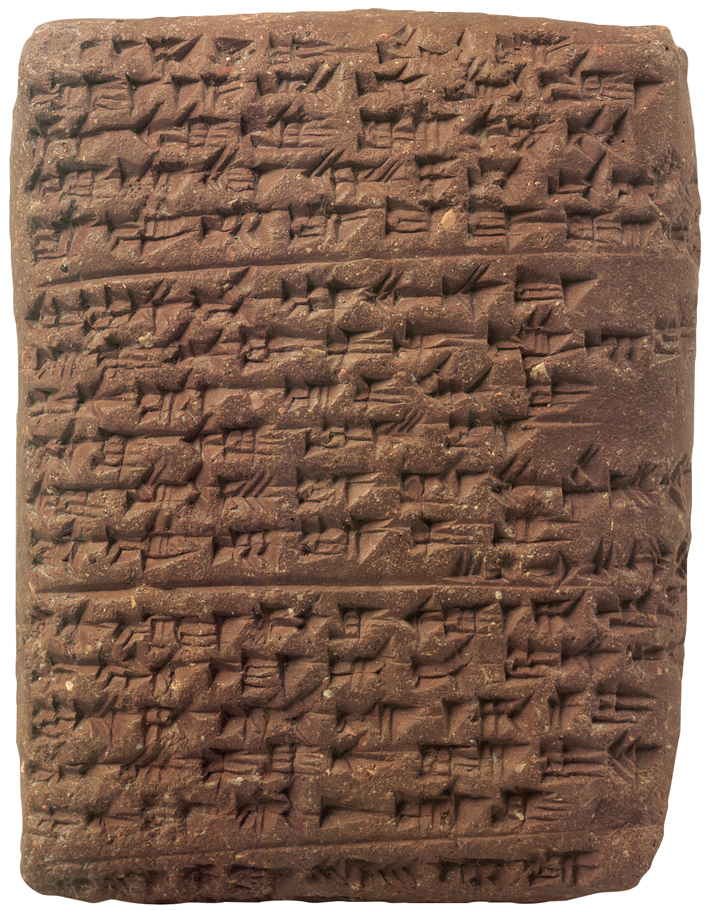 There were other objectives as well. Ruling Canaan allowed Egypt to check the expansion of the Hittite Empire and gave it control over trade routes from central Asia to the Mediterranean. “Egypt’s reason for being in Canaan was, first, strategic,” says archaeologist Israel Finkelstein of Tel Aviv University. “Canaan was important as a bridge to the north and the international routes to ports on the Mediterranean. Egypt could also exploit Canaan’s agricultural output,” he says. “The Egyptians imposed their rule and brought a certain stability while they exploited the land. Look at other empires through history—British, Roman—and you have that same balance of stability with exploitation.” Canaan’s rulers became vassals of the Egyptian state.
There were other objectives as well. Ruling Canaan allowed Egypt to check the expansion of the Hittite Empire and gave it control over trade routes from central Asia to the Mediterranean. “Egypt’s reason for being in Canaan was, first, strategic,” says archaeologist Israel Finkelstein of Tel Aviv University. “Canaan was important as a bridge to the north and the international routes to ports on the Mediterranean. Egypt could also exploit Canaan’s agricultural output,” he says. “The Egyptians imposed their rule and brought a certain stability while they exploited the land. Look at other empires through history—British, Roman—and you have that same balance of stability with exploitation.” Canaan’s rulers became vassals of the Egyptian state.
Once in charge, the Egyptians set up a colonial administration in Canaan whose inner workings are well documented. The main source of information is the Amarna Letters, an archive of 382 clay tablets unearthed in the ancient Egyptian city of Amar-na over several years around 1900. Written in Akkadian cuneiform, the diplomatic lingua franca of the day, the letters give a rich sense of how abjectly the Canaanite chieftains obeyed the Egyptian ruler and how they jockeyed for his favor. About 300 of the tablets were addressed directly to the pharaoh. One, written by the ruler of the city of Shechem to Amenhotep III, starts with the Canaanite vassal declaring himself “your servant and the dirt on which you tread. I fall at the feet of the king, my lord and my sun.” He then offers to send his own wife to the pharaoh if asked. In another letter, the ruler of Jerusalem frantically defends himself against accusations of disloyalty lodged by the leader of a rival city-state. In yet another, the king of Babylon demands justice for the murder of a Babylonian messenger who was crossing Canaan on his way to Egypt. “Canaan is your country, and its kings are your servants,” wrote the Babylonian. He enclosed a sapphire with the letter, to smooth tensions. Other letters relate more mundane business, such as details of food shipments or deliveries of horses.
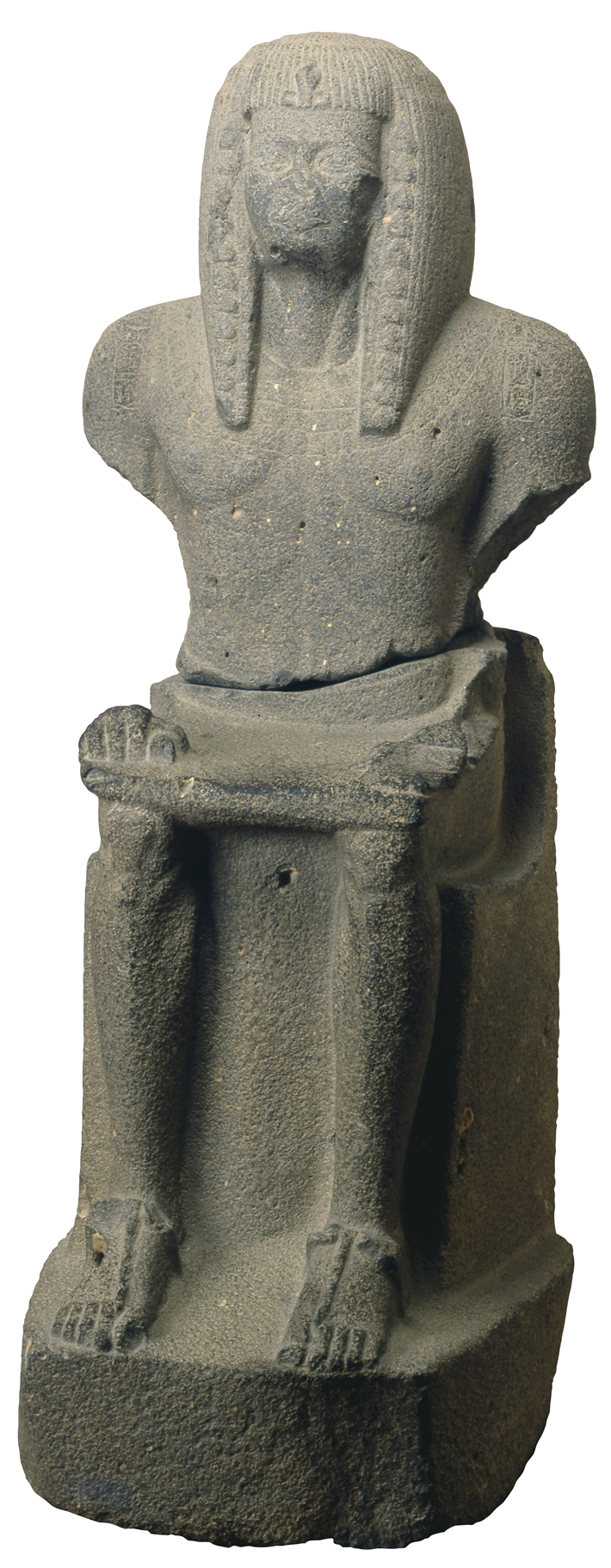 The Egyptian colonists imported or re-created all the visual propaganda of their power, with objects expressing the permanence of their empire. At the site of Beth Shean, near the Sea of Galilee, a life-size basalt figure of a seated Ramesses III presided over the entrance to one of the main temples. Excavated in the early twentieth century by University of Pennsylvania Museum archaeologists and now in the Israel Museum, the statue was carved from locally quarried stone by imported Egyptian artisans. Beth Shean was occupied mostly by Egyptian soldiers, scribes, and colonial bureaucrats, but, at other sites, ordinary Canaanites would have seen similar political statements. At Hazor, one of ancient Canaan’s largest cities, a team from the Hebrew University of Jerusalem recently found part of a sphinx made of gneiss, a valuable stone used by the Egyptians for statues of gods and rulers. The sphinx bears an inscription to Menkaure (r. 2490–2472 B.C.), a pharaoh who was originally interred in one of Giza’s pyramids. Yet the layer of the excavation in Hazor where the statue was found dates from centuries later in the mid-second millennium B.C. The sphinx had probably been imported from Egypt to lend status to a temple, a relic from the old days meant to lend prestige to Egypt’s new colony.
The Egyptian colonists imported or re-created all the visual propaganda of their power, with objects expressing the permanence of their empire. At the site of Beth Shean, near the Sea of Galilee, a life-size basalt figure of a seated Ramesses III presided over the entrance to one of the main temples. Excavated in the early twentieth century by University of Pennsylvania Museum archaeologists and now in the Israel Museum, the statue was carved from locally quarried stone by imported Egyptian artisans. Beth Shean was occupied mostly by Egyptian soldiers, scribes, and colonial bureaucrats, but, at other sites, ordinary Canaanites would have seen similar political statements. At Hazor, one of ancient Canaan’s largest cities, a team from the Hebrew University of Jerusalem recently found part of a sphinx made of gneiss, a valuable stone used by the Egyptians for statues of gods and rulers. The sphinx bears an inscription to Menkaure (r. 2490–2472 B.C.), a pharaoh who was originally interred in one of Giza’s pyramids. Yet the layer of the excavation in Hazor where the statue was found dates from centuries later in the mid-second millennium B.C. The sphinx had probably been imported from Egypt to lend status to a temple, a relic from the old days meant to lend prestige to Egypt’s new colony.
Egypt’s power wasn’t felt only in mighty sculptures. It also wielded a strong cultural pull on Canaan’s elite, who were attracted to Egypt’s graceful jewelry and symbols. Archaeologists have found hundreds of Egyptian-style objects in Canaanite burials, including alabaster, glass, and carnelian jewelry, scarabs decorated with sphinxes and hieroglyphs, and clay pots. Wealthy Canaanites liked to stock their tombs with imitations of Egyptian ushabti, figurines of people who would tend to the dead in the afterlife. “There was an Egyptianization, so to speak, of Canaan’s material culture,” says Ben-Tor. “The Canaanites were burying their dead with objects imported from Egypt or with local imitations of them.”

Sometimes the Canaanites added their own twists to Egyptian customs. About 130 clay coffins, some decorated with naturalistic human faces, have been excavated near Beth Shean and Gaza, another center of Egyptian control. Such caskets were commonly used in Egypt, but in Canaan they were filled not just with Egyptian-style mortuary goods, but also Canaanite items. Sometimes two people were buried in a single coffin, which was unheard of in Egypt but a common practice in Canaan.
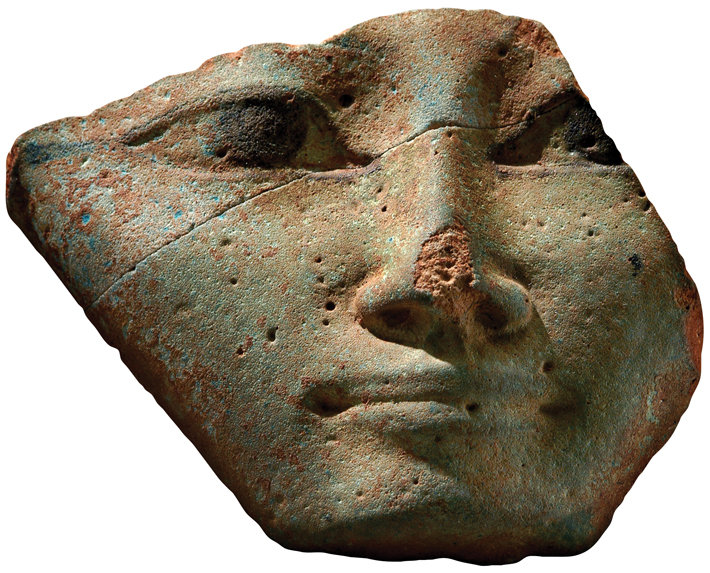 Along with adopting Egyptian burial practices, or their version of them, the Canaanites also came to worship the Egyptian goddess Hathor. She was associated with love, music, and a kind of feminine grace that Egyptians and Canaanites alike admired, and was the only Egyptian deity absorbed into the Canaanite pantheon. Her distinctive look, with almond-shaped eyes, long curls, and the ears of a cow, appears on objects both plain and fine and in archaeological contexts ranging from houses to palaces.
Along with adopting Egyptian burial practices, or their version of them, the Canaanites also came to worship the Egyptian goddess Hathor. She was associated with love, music, and a kind of feminine grace that Egyptians and Canaanites alike admired, and was the only Egyptian deity absorbed into the Canaanite pantheon. Her distinctive look, with almond-shaped eyes, long curls, and the ears of a cow, appears on objects both plain and fine and in archaeological contexts ranging from houses to palaces.
For a time, Egypt’s power and cultural influence ran deep. But it was not to last. After Ramesses III (r. 1183–1153 B.C.) died, a line of much weaker rulers came to power—all named Ramesses and all incapable of dealing with the increasingly restive Canaanite masses. Severe drought took hold around 1200 B.C., confirmed recently by dates obtained from sediment levels in the Sea of Galilee and the Dead Sea. Hungry people migrated in search of reliable food sources, undermining the established order throughout the region. Coastal cities came under assault from marauders contemporary scholars call the Sea Peoples. Their exact identity remains a mystery, but they likely included people from southwestern Turkey and the Aegean islands and were opportunistic raiders who burned and pillaged seaports and inland cities.
“Canaan was in a spiraling collapse that, once it started, fed off itself,” says Eric Cline of George Washington University. “The invasion of the Sea Peoples was one factor, but there was drought and with it came famine.” Even before Ramesses III’s rule, loyal Canaanite lords had warned in their letters to the pharaoh of uprisings and plots by rival states, and archaeological evidence suggests insurrection swept the Canaanite interior. By 1130 B.C., people had burned down the Egyptian ruling compounds in Megiddo, Lachish, and at least a dozen other cities. At some, up to 15 feet of ash have been discovered. Finally, the spreading revolt reached Jaffa.
Built on a hilltop overlooking the sea, Jaffa’s history of settlement stretches back more than 5,000 years. Its modern seaport, filled with fishing dinghies and yachts, faces the Mediterranean on the hill’s western side. But in antiquity the port was on the opposite side, east of the city, up a marshy estuary that protected ships from storms and impeded access to the city over land. Egypt captured Jaffa during Thutmose III’s first wave of conquest, a victory described in a tale called the “Taking of Joppa” (Joppa being an old name for Jaffa) that appears on a papyrus discovered in Egypt around 1870, now in the British Museum. The story goes that the Egyptian commander Djehuti feigned surrender after being rebuffed in his attempt to take Jaffa. He then offered 200 baskets as tribute to the Canaanites. Concealed in the baskets were Egyptian soldiers who, once inside the city, leapt out and conquered it.
Canaanites elsewhere may have warmed to Egyptian rule, but not in Jaffa. It was a foreign outpost in an often hostile land, says Burke. The absence of Canaanite materials from the Egyptian period inside the city’s walls attests to the strained relationship between the two communities, he believes. “We can reconstruct the whole hierarchy of Egyptian control here: the way the city gained a military foothold, reached its height during the time of Ramesses II, and then was abandoned, and in almost all that time it was isolated from the surrounding Canaanite culture”—so isolated, in fact, that elite Egyptian men brought their wives, he says, suggesting colonial officers spurned local women. “The lower ranks may have married local girls.” The Egyptians wouldn’t even bury their dead in this foreign land. Burke has found no Egyptian graves in Jaffa because, he believes, Egyptian corpses were sent home for burial. The Egyptians imported their own ceramics and even delicacies such as Nile perch, a few bones of which have been found.
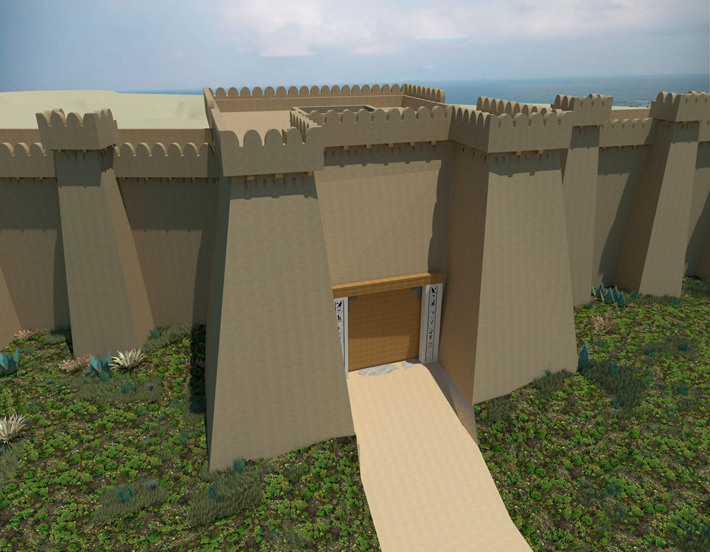
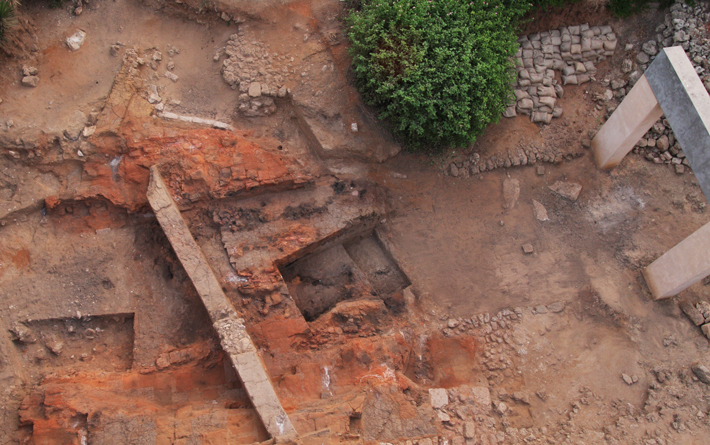 In Egyptian times, anyone entering Jaffa passed under an imposing square gate made of two mudbrick towers joined on top by a wide, two-story wooden bridge that formed a covered passageway. American archaeologist Jacob Kaplan excavated fragments of the gate’s monumental facade around 1960. He found less than half its decorative elements, but enough remained to discern the gate’s carved invocation to Egypt’s—and now Canaan’s—absolute ruler: “Horus-Falcon, Strong Bull, Beloved of Maat, King of Upper and Lower Egypt, Usermaatre Setepenre, Son of Re, Lord of Crowns, Ramesses.” Burke says, “This gate said to everyone who came, ‘This is Egypt.’”
In Egyptian times, anyone entering Jaffa passed under an imposing square gate made of two mudbrick towers joined on top by a wide, two-story wooden bridge that formed a covered passageway. American archaeologist Jacob Kaplan excavated fragments of the gate’s monumental facade around 1960. He found less than half its decorative elements, but enough remained to discern the gate’s carved invocation to Egypt’s—and now Canaan’s—absolute ruler: “Horus-Falcon, Strong Bull, Beloved of Maat, King of Upper and Lower Egypt, Usermaatre Setepenre, Son of Re, Lord of Crowns, Ramesses.” Burke says, “This gate said to everyone who came, ‘This is Egypt.’”
Burke and Peilstöcker have revealed a city of soldiers and Egyptian transplants, living on grains and fruits brought by Canaanite farmers to the Ramesses gate. Kaplan had uncovered 22 brewing pots, identical to those that appear in Egyptian wall paintings, showing that the soldiers brewed their own beer. They also had mementos from home, including several scarabs depicting Amenhotep III. Other finds, such as large Cypriot storage jars and fragments of Mycenaean vessels, point to the city’s cosmopolitan trade ties. But hardly any local wares have been found. “Given the lack of Canaanite objects inside the city walls, and the fires that destroyed it, it’s safe to say the Egyptians didn’t get along with the people living nearby,” says Peilstöcker. “If you just followed the biblical texts, you would think this was a very peaceful period, that the Egyptians were kind overlords. We find violence and upheaval.”
The revolt that Burke believes ended Egypt’s rule in Jaffa started about 1135 B.C., when the Ramesses gate burned down. It was rebuilt, but burned again some 10 years later. Burke believes the intensity of the heat from both fires shows that they were deliberately set.
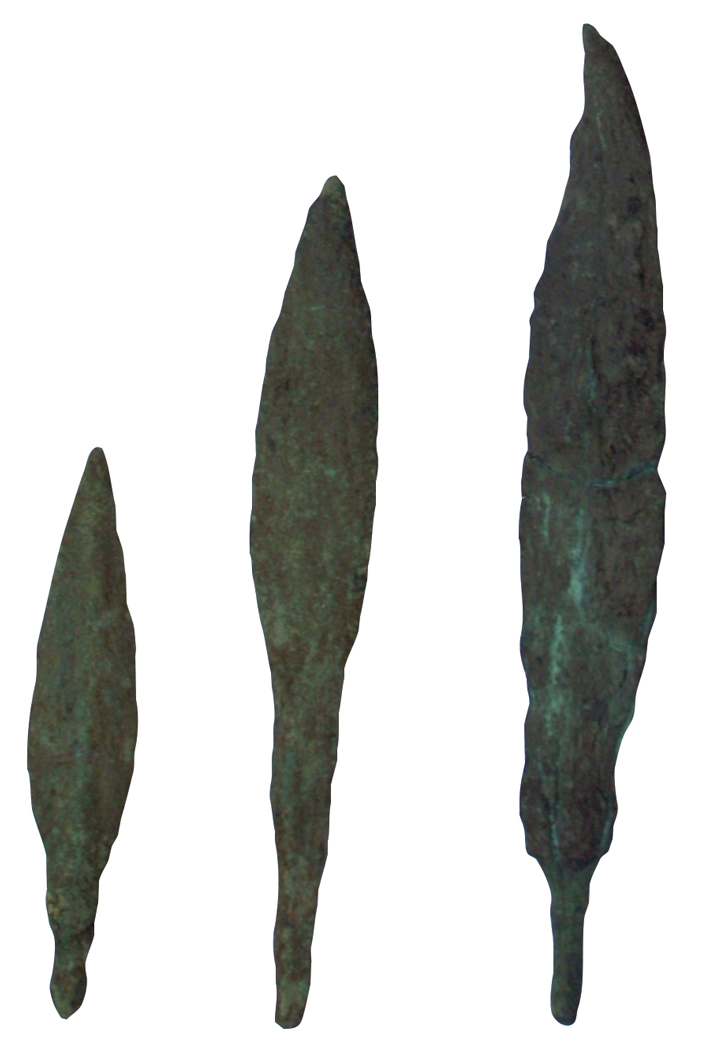 In the second blaze, mudbricks facing the covered passageway were singed with such heat that they turned a reddish brown, as if fired in a kiln. Ceramics burned to ash. Fragments of antlers belonging to 32 deer that decorated the passageway were partly melted. Passengers aboard ships in the Mediterranean would have seen billows of black smoke as Jaffa’s wood-and-thatch roofs blazed. According to Burke, the circumstantial evidence suggests that Canaanites set the fire themselves. He says, “Could it have been Sea Peoples? Maybe. But the dates we found are 50 years after destructions associated with them.”
In the second blaze, mudbricks facing the covered passageway were singed with such heat that they turned a reddish brown, as if fired in a kiln. Ceramics burned to ash. Fragments of antlers belonging to 32 deer that decorated the passageway were partly melted. Passengers aboard ships in the Mediterranean would have seen billows of black smoke as Jaffa’s wood-and-thatch roofs blazed. According to Burke, the circumstantial evidence suggests that Canaanites set the fire themselves. He says, “Could it have been Sea Peoples? Maybe. But the dates we found are 50 years after destructions associated with them.”
Burke and Peilstöcker have been able to reconstruct roughly how Jaffa’s final insurrection transpired. The team has recovered bent arrowheads, a spearhead, and a lead weight inside the Ramesses gate, where the fighting must have broken out. They think that the attackers then set fire to the wooden platform between the two towers. It collapsed into the passageway below, on top of piles of seeds, olives, pistachios, lentils, dates, grapes, and wheat. Radiocarbon dating of 21 scorched seeds shows that the fire happened between 1134 and 1115 B.C., with the highest probability falling at 1125 B.C. Burke says that this is the latest confirmed date of Egyptian settlement in Canaan. Yet some scholars are skeptical it all ended in Jaffa.
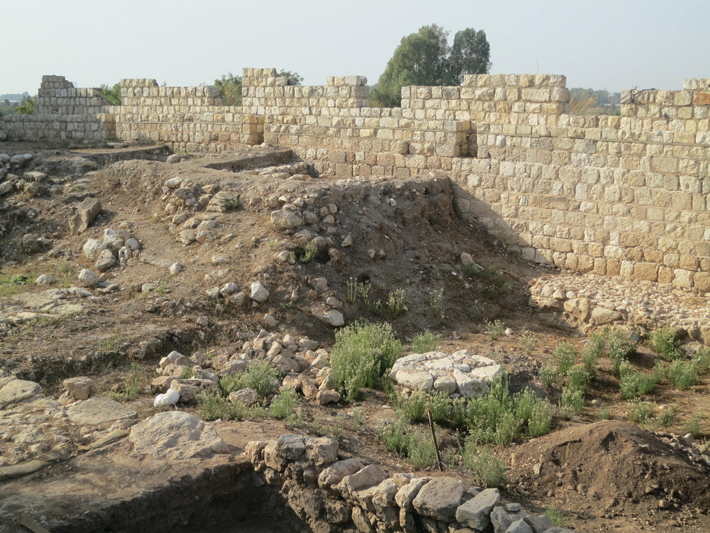 Into the beginning of the next century, there would be an Egyptian presence in Beth Shean, says Ben-Tor. “Jaffa wasn’t the last Egyptian center,” she says, “although it fell around the same time as the others.” In any case, nearby Egyptian outposts also experienced fiery ends. Twelve miles inland from Jaffa stood the granary estate of Aphek, where today stand the ruins of a sixteenth-century Ottoman fortress. Excavations in the 1970s by archaeologists from Tel Aviv University found the granary buried under six feet of charred timbers and debris. Aphek’s destruction suggests that the torching of Jaffa was not an isolated attack, but rather a component part of a general insurrection. Burke surmises it probably disrupted Jaffa’s grain supplies, making the Egyptians’ position that much more precarious. In 1125 B.C., the sight, from Jaffa, of smoke rising from Aphek would have made clear that Egypt’s rule in Canaan was over.
Into the beginning of the next century, there would be an Egyptian presence in Beth Shean, says Ben-Tor. “Jaffa wasn’t the last Egyptian center,” she says, “although it fell around the same time as the others.” In any case, nearby Egyptian outposts also experienced fiery ends. Twelve miles inland from Jaffa stood the granary estate of Aphek, where today stand the ruins of a sixteenth-century Ottoman fortress. Excavations in the 1970s by archaeologists from Tel Aviv University found the granary buried under six feet of charred timbers and debris. Aphek’s destruction suggests that the torching of Jaffa was not an isolated attack, but rather a component part of a general insurrection. Burke surmises it probably disrupted Jaffa’s grain supplies, making the Egyptians’ position that much more precarious. In 1125 B.C., the sight, from Jaffa, of smoke rising from Aphek would have made clear that Egypt’s rule in Canaan was over.
Roger Atwood is a contributing editor at ARCHAEOLOGY.